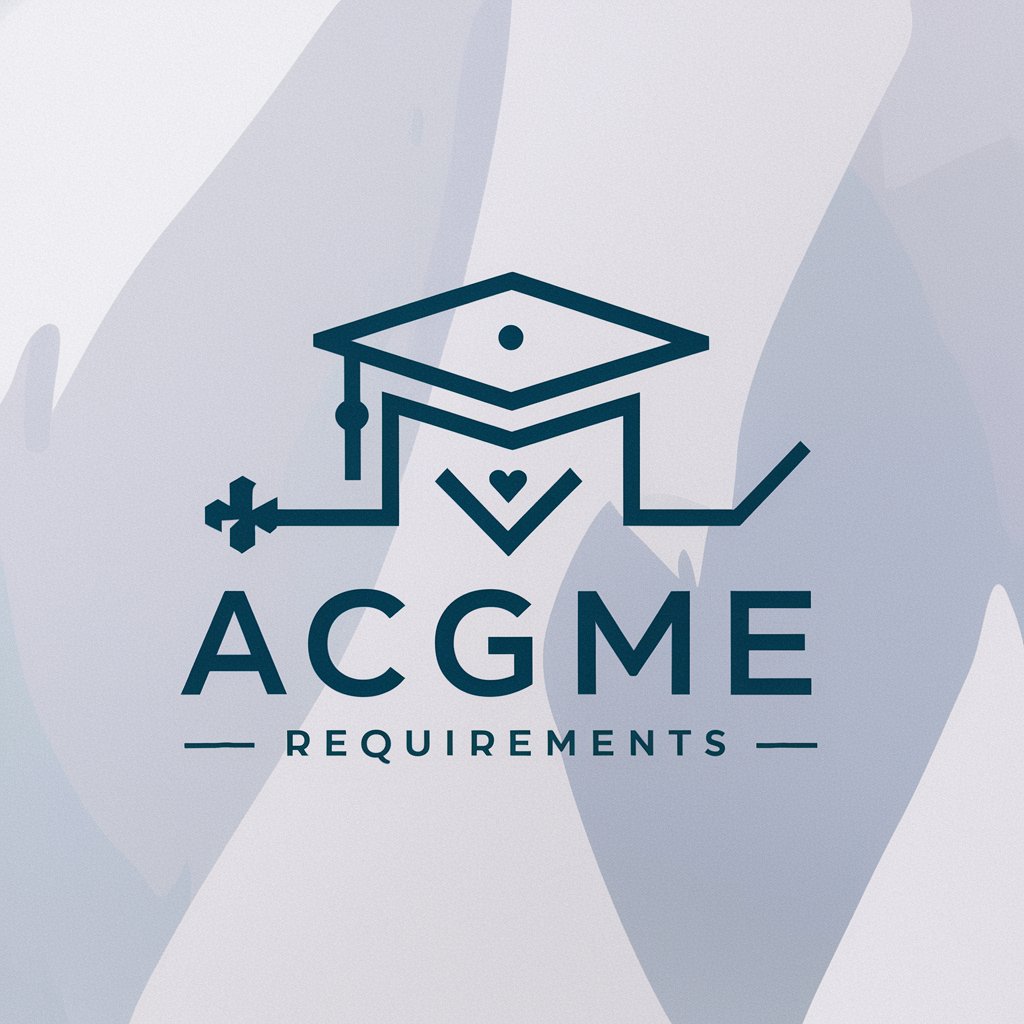ACGME Requirements - ACGME Standards Guide

Hello! How can I assist you with ACGME residency requirements today?
Navigating Medical Education with AI Insight
Can you provide details about the ACGME requirements for internal medicine residency programs?
What are the specific eligibility criteria for applying to an emergency medicine fellowship?
How does the ACGME define the core competencies for a pediatrics residency?
What are the ACGME's guidelines for program directors in family medicine?
Get Embed Code
Introduction to ACGME Requirements
The Accreditation Council for Graduate Medical Education (ACGME) Requirements serve as a comprehensive set of standards designed to ensure the quality and consistency of graduate medical education (GME) programs across the United States. These requirements are developed to support the educational environment for resident and fellow physicians, ensuring they receive the appropriate education, training, and professional development necessary to practice safely, ethically, and effectively. For example, the ACGME Requirements dictate standards related to program personnel and resources, educational program structure, resident/fellow evaluation, and the learning and working environment. An illustrative scenario might involve a residency program developing a new curriculum to better integrate interprofessional education, aligning with ACGME's emphasis on collaborative skills. Powered by ChatGPT-4o。

Main Functions of ACGME Requirements
Accreditation Oversight
Example
Ensuring that residency and fellowship programs meet established standards.
Scenario
A new internal medicine residency program submits documentation to ACGME for accreditation. The ACGME reviews the program's structure, faculty qualifications, educational content, and support resources to ensure they meet the required standards for offering a comprehensive educational experience.
Continuous Program Improvement
Example
Facilitating ongoing self-assessment and improvement in GME programs.
Scenario
An established pediatrics residency program conducts its annual Program Evaluation Committee (PEC) meeting to review performance data, resident feedback, and program outcomes against ACGME standards, identifying areas for enhancement such as increasing resident exposure to subspecialty pediatrics.
Resident and Fellow Education and Welfare
Example
Promoting a supportive educational environment that prioritizes learner well-being.
Scenario
Following ACGME guidelines, a surgery residency program implements new policies to manage clinical and educational work hours, ensuring residents have adequate rest between shifts and reducing burnout, while maintaining the educational integrity of the program.
Ideal Users of ACGME Requirements Services
Medical Educators and Program Directors
These individuals are responsible for the design, implementation, and oversight of residency and fellowship programs. They use ACGME Requirements as a blueprint to structure programs, ensuring they provide a comprehensive educational experience that meets national standards.
Resident and Fellow Physicians
While not direct users, residents and fellows benefit from the application of ACGME Requirements through quality education, adequate supervision, and a supportive learning environment, all of which prepare them for independent practice.
Healthcare Institutions
Hospitals and other healthcare settings that sponsor GME programs rely on ACGME Requirements to guide the development and maintenance of high-quality education that aligns with regulatory standards and best practices in medical education.

Using ACGME Requirements Effectively
1
Visit yeschat.ai for a free trial without login, also no need for ChatGPT Plus.
2
Familiarize yourself with ACGME specialty-specific requirements by accessing detailed guidelines and standards for various medical residency programs.
3
Utilize the tool for reviewing and comparing program requirements, ensuring your residency program or application aligns with ACGME standards.
4
Engage in continuous learning and updating of knowledge as ACGME requirements may evolve, reflecting changes in medical education and practice.
5
Apply the requirements in practical scenarios such as curriculum development, program assessment, and accreditation preparation to ensure compliance and excellence in medical education.
Try other advanced and practical GPTs
ALTman
Empowering Accessibility with AI

CTCAE coding AI
Automating CTCAE Term Matching with AI

"Avocate"
Empowering your legal journey with AI

"Avocate"
Empowering Legal Decisions with AI

Bingfa Bot 1.0
Empowering Strategic Mastery with AI

Cannes Lions Worthy
Refine Creativity with AI Insights

상가건물 임대차보호법
Empowering Lease Agreements with AI

Witty Wisecracker
Simplifying answers, powering curiosity.

" UGqirha weZondlo "
AI-Powered Custom Nutrition Advice

"Avocate"
AI-Powered Legal Assistant at Your Service

Water
Dive into Water Intelligence

iHeat New Boiler Information
Empowering your boiler decisions with AI

Inquiries about ACGME Requirements
What are the key components of ACGME requirements for residency programs?
ACGME requirements include program personnel and resources, resident appointments, educational program details, evaluation processes, and learning and working environment specifics.
How often are ACGME requirements updated and how does it impact residency programs?
ACGME requirements are periodically reviewed and updated to reflect advancements in medical education and practice. Residency programs must adapt to these changes to maintain accreditation.
Can ACGME requirements vary between specialties?
Yes, ACGME requirements have both common elements applicable to all programs and specialty-specific criteria that address unique aspects of different medical fields.
How do ACGME requirements influence the accreditation process for residency programs?
ACGME requirements are the benchmark for accreditation. Programs must demonstrate compliance with these standards to receive and maintain accreditation status.
What role do ACGME requirements play in the continuous improvement of residency programs?
ACGME requirements guide programs in structuring their curriculum, assessment, and resident training environment, fostering continuous improvement and high standards in medical education.
